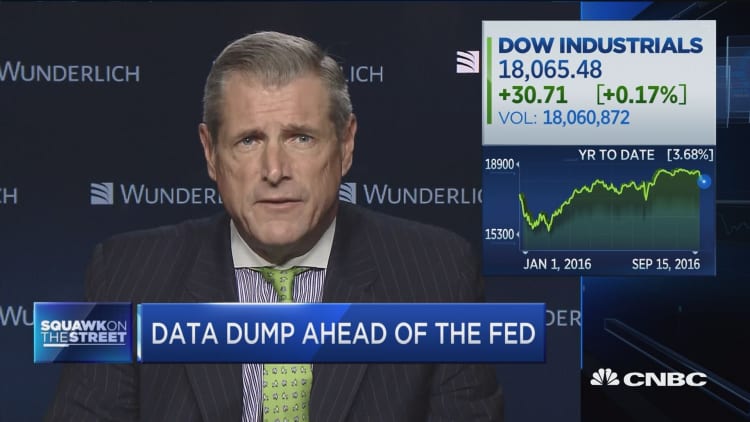
Consumer price inflation and consumer sentiment are on tap for markets Friday, and they could show more evidence of a soggy economy.
August's retail sales Thursday were down 0.3 percent, worse than expected, and the latest in a series of weak data. It was also more evidence that the consumer may be taking a pause.
Stock futures were lower with financial stocks weaker. European shares were trading lower, led by the banking sector. Deutsche Bank slumped 8 percent after it pushed back against a $14 billion Justice Department claim to settle allegations about mortgage securities.
Art Hogan, chief market strategist at Wunderlich Securities, said he's watching consumer sentiment to see if perhaps the consumer and economy are reflecting some of the uncertainty about the U.S. presidential election.
Markets are also nervous ahead of two key central bank meetings next week. Both the U.S. Federal Reserve and Bank of Japan hold important meetings Tuesday and Wednesday.
Consumer sentiment is expected to rise to 91 from 89.8. The Consumer Price Index is expected to rise by 0.1 percent from a flat reading in August. Excluding food and energy, it is expected to rise by 0.2 percent.
"There's an election coming up. It's too close to call and you don't know what the aftershocks are going to be," Hogan said. He said he met with investors across the country this week and their big concern was the election.
Markets will focus on what the data means for the Fed, but any action at its meeting next week has largely been written off.
Stocks were boosted in part Thursday because of that view, following a disappointing retail sales report and weaker than expected industrial production. The S&P 500 ended 1.01 percent higher at 2,147.26.
"Now we're flat post Labor Day. What's changed? Nothing, the only thing that literally changed is the consensus around a September liftoff has dissipated because of lackluster data," Hogan said. "We hope that's just August data and it's an aberration and not a trend."
As central banker comments at the end of last week raised concerns of tighter monetary policy in Europe and the United States, the three major U.S. stock indexes plunged more than 2 percent Friday in their worst daily performance since June 24, when global stocks sold off following the United Kingdom's surprise vote to leave the European Union.
Losses were so deep that the Dow Jones industrial average posted its worst week since the one ended January 8. This week, if Apple holds its gains, the Dow could post its best week since July 15.
Apple has accounted for more than 85 points of the Dow Jones industrial average's 127-point weekly gain. The stock has risen 12 percent for the week so far and is accounting for a little over a third of the S&P 500's weekly gains, according to S&P Global Market Intelligence.
The gains have come as iPhone preorder reports have showed strong demand ahead of the device's official launch in stores Friday.
Apple's gains also helped semiconductor stocks rise. Shares of its supplier Skyworks closed up more than 6 percent Thursday and is tracking for its best week since February 2013. The outperformance in Skyworks and other semiconductors sent the Nasdaq composite nearly 1.5 percent higher and on track for its best week since the one ended July 1.
— CNBC's Evelyn Cheng contributed to this report.


